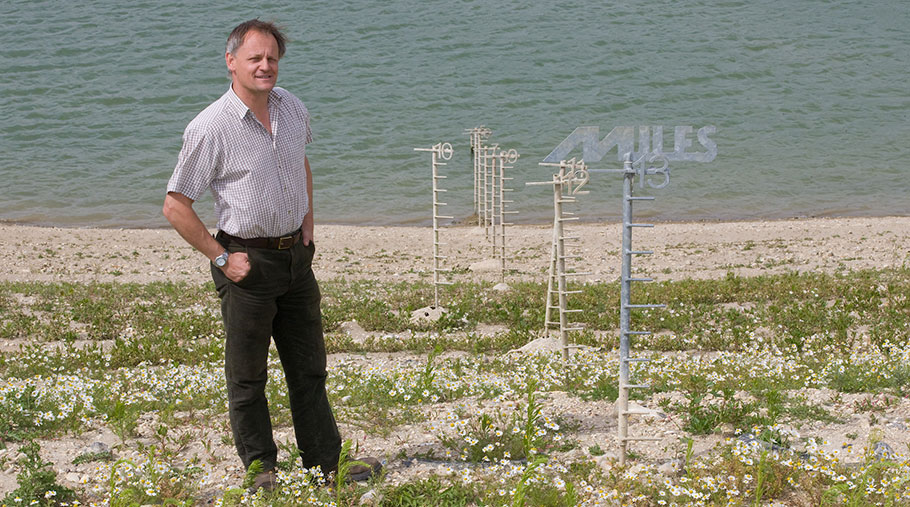Environment Agency steps up water abstraction inspections
 © Tim Scrivener
© Tim Scrivener The Environment Agency (EA) has stepped up farm inspections to ensure compliance with water abstraction licence conditions as the dry weather continues.
The agency has seen a “rapid decline” in reservoir levels in the North West and says it supports the announcement by United Utilities to manage water supplies by introducing a hosepipe ban from 5 August.
However, groundwater supplies are at healthy levels across most of England and water companies have enough water to maintain supplies provided resources are managed properly.
See also: All you need to know about water abstraction licensing reform
But following two months of prolonged, dry weather, many rivers around the country have dropped to levels lower than is normal for this time of year, which can be damaging to wildlife.
The EA says it has robust plans in place to respond to these pressures. It has stepped up its incident response as well as regulation of those abstracting water to ensure the environment is protected.
Paul Hickey, EA head of water resources, said: “We are meeting with affected groups including farmers to provide practical advice about conserving water and planning for prolonged, dry weather.
“We encourage everyone to use water wisely to conserve supplies and protect the environment.”
We are advising landowners to use a water meter so, if the Environment Agency inspectors turn up on farm, they can demonstrate they are abstracting within the limits Susan Twining, CLA
‘Abstract within the limits’
Susan Twining, CLA chief land use policy adviser, said farms that have existing boreholes can extract up to 20cu m/day of water – the equivalent of 4,400 gallons – without the need for an abstraction licence.
But she added: “We are advising landowners to use a water meter so, if the EA inspectors turn up on farm, they can demonstrate they are abstracting within the limits.”
Ms Twining said the prolonged dry weather should be a stimulus for farmers to review their water use and look at alternative ways to secure their future supply.
Essential information about water abstraction and licensing
Rules of abstraction
- Abstraction is governed by the Environment Agency (EA)
- You can abstract up to 20cu m/day of water without an abstraction licence
- Any more than this will require a licence from the EA
- You can apply for a temporary licence to abstract more than 20cu m/day over a period of less than 28 days
For businesses relying on private water supplies
- A 20cu m/day threshold for abstraction without a licence applies
- It is recommended you use a meter so you can demonstrate use if inspected by the EA
- If additional demand in hot weather means you might exceed this amount you should contact the EA for a temporary licence
- Local authorities have responsibility for private water supplies being used for domestic use
- If water is running low, which may also affect the quality, you should make your own provisions for alternative supplies or contact the local authority who can provide supplies for domestic use (for a charge)
- They do not cover other business use so supplies for dairy washing, livestock and other uses are not covered by this arrangement
Early and advance planning is recommended
- There should be a formal plan to deal with water shortage situations, particularly where others are dependent on the private supply
- Best practice is that formal agreements (usually the tenancy agreement) should state how and when insufficient supplies are dealt with
Source: CLA
Case study: Andrew Blenkiron, Euston Estate, Norfolk
Reservoir investment offers long-term water security for Norfolk grower

Andrew Blenkiron © Tim Scrivener
Norfolk-based grower Andrew Blenkiron invested £700,000 in two farm reservoirs after dry weather reduced his irrigated cropping area by 20% in 2012.
Mr Blenkiron, estate director at the 4,400ha Euston Estate, near Thetford, says investing in water infrastructure has given him the security to be able to pump water throughout the year.
One reservoir has a capacity to store 110m gallons of water, and the other 80m gallons.
His Environment Agency licence allows him to abstract water from two rivers throughout the year to fill the reservoirs, even during summer if flows are high.
“Many farms only have borehole abstraction, whereas we have the ability to abstract water from the river at high flows,” said Mr Blenkiron.
“Our principal borehole gives us about 42m gallons (15-20%) of our total volume. We use this groundwater first to its maximum volume. It has got a meter on it.
“The beauty of having the reservoirs is once you have harvested the water from slow river flows, we can use it whenever we like.”
Mr Blenkiron, who is also a Farmers Weekly Arable Farmer Focus writer, uses about 180m gallons a year to irrigate potatoes, onions, carrots, parsnips to mitigate droughty soils and low summer rainfall.
Because of the recent dry weather, he has started to “eat in” to his 20% reserve of water.
“If we get a dry winter this year, my ability to pump out of the rivers will be curtailed, which would take us back into a 2012 situation,” he said.
Mr Blenkiron is involved in a water “D-Risk” project with Cranfield University and Defra, which enables him to use data to calculate his annual water requirements based on his cropping area.
He also trades water with neighbouring farmers if they have spare volume left on their licences.
